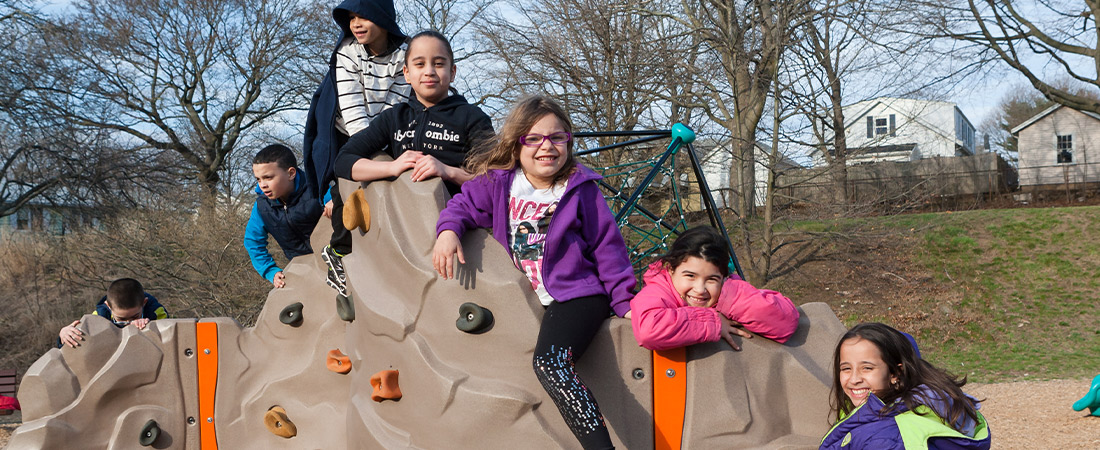
Powerful learning experiences often happen outside of the school day. EDC builds, implements, and evaluates out-of-school and nonformal programs that deliver core civic, educational, and life skills to young people in diverse environments.
In the United States, EDC’s support for out-of-school time (OST) and nonformal learning leverages children’s and youth’s strengths to help them succeed at school, engage in their communities, and lead productive and healthy lives. We design, evaluate, and provide technical assistance on high-quality OST programs that prepare young people for success—whether pursuing social and academic enrichment after school or leaving school and starting a first job.
Internationally, EDC develops and implements programs that support educational and economic opportunities for out-of-school youth. Working within the unique context of each country, we partner with governments, industry, and nongovernmental organizations to provide young people with the skills, knowledge, and opportunities they need to be market-ready and contribute to society.
Related Content
EDC Talks: How Do You Develop High-Quality Out-of-School-Time Programs?
Children can learn a lot from programs that take place outside of school hours.
4 Ways to Strengthen Youth Programs in Conflict and Crisis Areas
Building youth programs in unstable regions can be challenging. Here are four ideas for practitioners.
A Success Story in Senegal
Meet Adama Diedhiou, a participant in EDC’s workforce development program in Senegal.
A Second Chance at School in Mali
In Mali, accelerated education is helping thousands of children get back to school.
3 Ways to Stop the Summer Slide
Want to help kids keep learning this summer? Here are some tips for parents and caregivers.
New Entrepreneurs Launched in Rwanda
EDC’s workforce development efforts in Rwanda are helping young people build the skills for work.
Projects
Resources
Here are a few of our resources on out-of-school learning. To see more, visit our Resources section.
This report is part of a series of publications summarizing what is being learned “on the ground” from projects in more than a dozen countries, and is the product of the pilot phase of the first EQ
This report presents findings from a study that EDC conducted for the Massachusetts Departments of Early Education and Care and of Elementary and Secondary Education.
The Somali Interactive Radio Instruction Program (SIRIP) advances stabilization in Somalia by delivering education in a precarious situation and by giving children the capabilities they will need t
This article explores the effects of EDC’s Tikichuela early childhood mathematics initiative, developed with the government of Paraguay.
This report details the work of the Akazi Kanoze (AK) Youth Livelihoods Project, which was funded by the U.S. Agency for International Development and implemented by EDC.
This report builds on the DeliverEd research in Ghana, Pakistan, Jordan, Sierra Leone, and Tanzania that sheds light on the effectiveness of delivery approaches for improving policy implementation. It proposes a framework for policymakers to consider when determining whether and how to launch, learn from, and scale and sustain delivery approaches.
This 2-page document summarizes the impact of IDEJEN, the Haitian Out-of-School Youth Livelihood Initiative, which addresses the education and livelihood needs of youth ages 15-24 with little or no primary education.
This paper explores how the Government of Mali, with support from the U.S. Agency for International Development and Education Development Center, Inc., used innovative tools and methods (including georeferencing, mapping, and school/village surveys) to better understand the twin challenges posed by home-school distance and inefficient teacher distribution in rural communities and why Mali chose an old-school solution: one-room, multi-grade schools equipped with trained teachers and appropriate materials.
The USAID Huguka Dukore activity is a 5-year (December 9, 2016-December 8, 2021) youth employment program that will provide 40,000 out-of-school youth, including 34,000 new youth and 6,000 Akazi Kanoze alumni, with market-relevant employability skills and pathways to new or better employment.
This final report summarizes the evaluation of the impact of EDC’s Early Childhood Caregiver Professional Development and Certification Program in Rwanda.
